The 'Prussian films' on Frederick the Great were a huge success in Weimar. The Aafa Film company decided to produce also a film set at the court of 18th century Prussia: Zopf und Schwert/Braid and Sword (Victor Janson, 1926). It starred Mady Christians as Princess Wilhelmine - Frederick's sister, William Dieterle as her lover, the Prince of Bayreuth, Hanni Weisse as the Princess's lady-in-waiting Von Sonnsfeld, and Albert Steinrück as King Frederick Willliam I of Prussia.
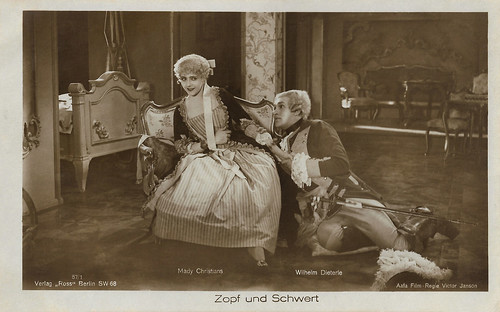
German postcard by Ross Verlag, no. 57/1. Photo: Aafa Film. Mady Christians and Wilhelm (William) Dieterle in Zopf und Schwert - Die tolle Prinzessin (Victor Janson, 1926).
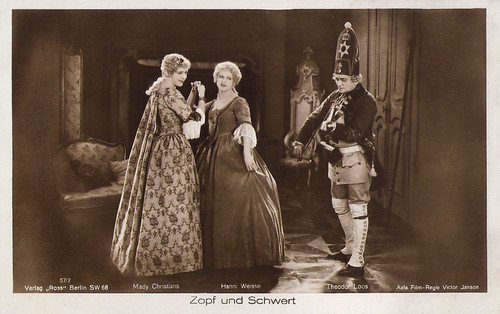
German postcard by Ross Verlag, no. 57/2. Photo: Aafa Film. Mady Christians, Hanni Weisse and Theodor Loos in Zopf und Schwert - Die tolle Prinzessin (Victor Janson, 1926).
Zopf und Schwert is a romantic comedy, based on the stage play (1843) by Karl Gutzkow. The exact plot of the (lost) film is unknown but the stage play creates a fictitious love story between Prince Frederick of Brandenburg-Bayreuth (1711-1763) and Princess Wilhelmine (1709–1758), daughter of King Frederick Wilhelm I of Prussia and sister of the future Frederick the Great.
The story takes place after 1730, when, historically, the stern, army loving King had punished his son with exile to Küstrin (now the Polish Kostrzyn nad Odrą) after the latter had tried to flee to France, fed up with his father's brutal behaviour. Frederick's aid Katte was decapitated before his eyes. Wilhelmine, considered part of the Crown Prince's 'desertion', was locked up in her rooms. Both brother and sister had been threatened with death.
While the Queen wanted to marry Wilhelmine with a British royal, her father wanted an alliance with Habsburg, but nothing came of it. In 1731 Wilhelmine married Frederick of Brandenburg-Bayreuth, future Margrave, who initially was betrothed to Wilhelmine's younger sister, but their father at the last moment shifted daughters, even without asking the groom.
Wilhelmine was forced into the marriage by her father and thus hoped to relieve the conflict between the King and the Crown Prince. When the Margrave got into his inheritance, the couple turned Bayreuth in a little Versailles. Their building activities, rebuilding the residence and the opera house, and building a new opera, a theatre, a palace and an university, almost bankrupted the principality. The couple had only one daughter, who died young.
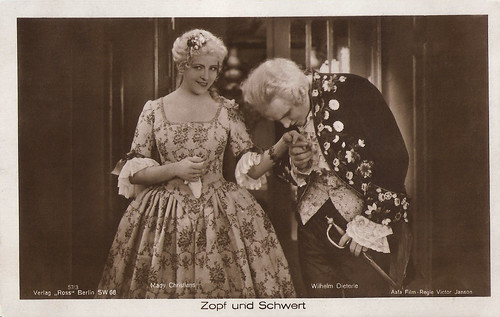
German postcard by Ross Verlag, no. 57/3, Photo: Aafa Film. Mady Christians and Wilhelm Dieterle in Zopf und Schwert - Die tolle Prinzessin (Victor Janson, 1926).
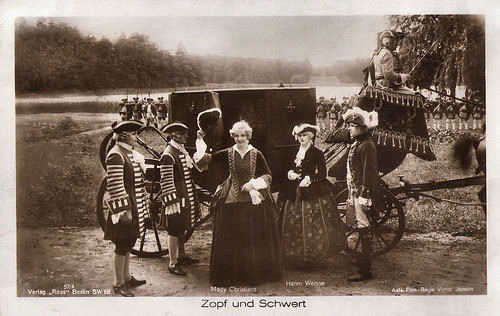
German postcard by Ross Verlag, no. 57/4. Photo: Aafa Film. Publicity still of Mady Christians and Hanni Weisse in Zopf und Schwert - Die tolle Prinzessin/Braid and sword (Victor Janson, 1926).
In Karl Gutzkow's stage play, the situation is presented as less calculating and horrifying. The Prince of Bayreuth (Wilhelm Dieterle), who is a close friend of and go-between for the exiled Crown Prince Frederick (Walter Janssen), visits the Prussian court and falls in love with Wilhelmine (Mady Christians).
The Queen (Julia Serda), related to the British King, orders him to mediate with her husband (Albert Steinrück) in marrying off her daughter with the Prince of Wales. The King, who officially wants to marry her to Habsburg, confesses Bayreuth he agrees with the British marriage and orders him to throw a huge party.
Moreover, Bayreuth happens to know the British envoy Hotham (Robert Scholtz) from his time in England, and hears from him a Prussian-British trade contract is behind all this. Bayreuth betrays all this to Wilhelmine and declares her his own love.
With help of her lady-in-waiting Sonnsfeld (Hanni Weisse), Wilhelmine masks as an unknown white lady and tries to escape her rooms. Sonnsfeld seduces the guard Eckhoff (Theodor Loos), who happens to be an amateur violin player, to play for them so they can dance, despite the King's disgust of music and dance.
The King surprises them, degrades the officer to stage player (which he doesn't mind), orders Sonnsfeld to move to another court (which she doesn't mind), and announces his daughter her future marriage.
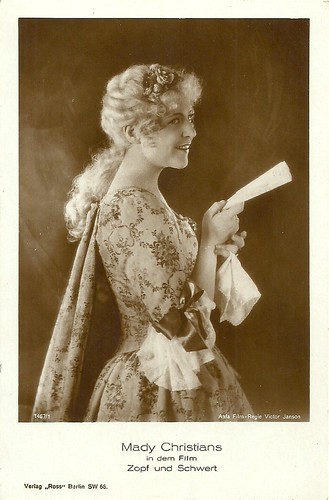
German postcard by Ross Verlag, no. 1467/1. Photo: Aafa Film. Mady Christians in Zopf und Schwert - Die tolle Prinzessin (Victor Janson, 1926).
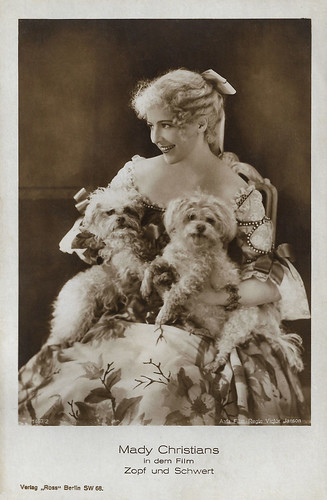
German postcard by Ross Verlag, no. 1467/2. Photo: Aafa Film. Mady Christians in Zopf und Schwert - Die tolle Prinzessin (Victor Janson, 1926).
When the King hears the British want to restore the earlier free trade between the two nations, he explodes. He immediately orders Bayreuth to go to Vienna to arrange a marriage with Habsburg.
Hotham, in reality, is only helping Bayreuth by discrediting his own employer. Hotham and the King battle over the failed affair but peace is made over beer and tobacco, with Bayreuth present as well.
However, at the smoking table with all the King's men, and forced to talk, Bayreuth gently but critically creates the King's doubt whether he has thought of the hearts of his children in his deeds and arrangements.
When the King, masked in a white domino, surprises the Queen and her ladies-in-waiting in card plays with money and drinking forbidden teas and coffees, a mysterious lady in white appears, who happens to be Wilhelmine, helped to escape from her rooms by her mother. She confesses she has had a secret rendez-vous with the Prince of Wales.
Just when the King threatens to divorce because of this affront, Hotham appears telling that the Prince of Wales has fled after Bayreuth challenged him to a duel, because he loved the princess too (it is all a scam by Hotham, as the real Prince of Wales was never around, only his rumour). Finally, King and Queen agree with the marriage of their daughter to Bayreuth, even more so as their future son-in-law has announced he will join the Prussian army.
Zopf und Schwert (Victor Janson, 1926) was scripted by Jane Bess and Adolf Lantz, the cinematography was by Carl Drews, sets and costumes were designed by Ernst Stern. Rudolf Dworsky was the producer. The film premiered in Berlin on 26 August 1926. 'Zopf' in the title refers to the braid of a wig Prussian officers wore then, 'Schwert' clearly refers to their swords.
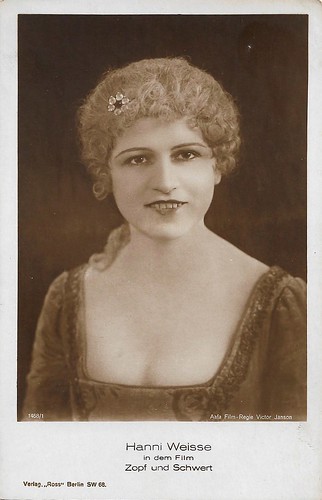
German postcard by Ross Verlag, no. 1468/1. Photo: Aafa Film. Hanni Weisse in Zopf und Schwert - Die tolle Prinzessin (Victor Janson, 1926).
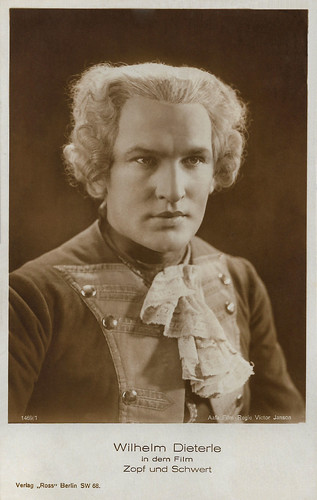
German postcard by Ross Verlag, no. 1469/1, 1927-1928. Photo: Aafa Film. Wilhelm Dieterle in Zopf und Schwert - Die tolle Prinzessin (Victor Janson, 1926).
Sources: Wikipedia and IMDb.

German postcard by Ross Verlag, no. 57/1. Photo: Aafa Film. Mady Christians and Wilhelm (William) Dieterle in Zopf und Schwert - Die tolle Prinzessin (Victor Janson, 1926).

German postcard by Ross Verlag, no. 57/2. Photo: Aafa Film. Mady Christians, Hanni Weisse and Theodor Loos in Zopf und Schwert - Die tolle Prinzessin (Victor Janson, 1926).
A Princess locked up in her rooms and threatened to death
Zopf und Schwert is a romantic comedy, based on the stage play (1843) by Karl Gutzkow. The exact plot of the (lost) film is unknown but the stage play creates a fictitious love story between Prince Frederick of Brandenburg-Bayreuth (1711-1763) and Princess Wilhelmine (1709–1758), daughter of King Frederick Wilhelm I of Prussia and sister of the future Frederick the Great.
The story takes place after 1730, when, historically, the stern, army loving King had punished his son with exile to Küstrin (now the Polish Kostrzyn nad Odrą) after the latter had tried to flee to France, fed up with his father's brutal behaviour. Frederick's aid Katte was decapitated before his eyes. Wilhelmine, considered part of the Crown Prince's 'desertion', was locked up in her rooms. Both brother and sister had been threatened with death.
While the Queen wanted to marry Wilhelmine with a British royal, her father wanted an alliance with Habsburg, but nothing came of it. In 1731 Wilhelmine married Frederick of Brandenburg-Bayreuth, future Margrave, who initially was betrothed to Wilhelmine's younger sister, but their father at the last moment shifted daughters, even without asking the groom.
Wilhelmine was forced into the marriage by her father and thus hoped to relieve the conflict between the King and the Crown Prince. When the Margrave got into his inheritance, the couple turned Bayreuth in a little Versailles. Their building activities, rebuilding the residence and the opera house, and building a new opera, a theatre, a palace and an university, almost bankrupted the principality. The couple had only one daughter, who died young.

German postcard by Ross Verlag, no. 57/3, Photo: Aafa Film. Mady Christians and Wilhelm Dieterle in Zopf und Schwert - Die tolle Prinzessin (Victor Janson, 1926).

German postcard by Ross Verlag, no. 57/4. Photo: Aafa Film. Publicity still of Mady Christians and Hanni Weisse in Zopf und Schwert - Die tolle Prinzessin/Braid and sword (Victor Janson, 1926).
A less calculating and horrifying situation
In Karl Gutzkow's stage play, the situation is presented as less calculating and horrifying. The Prince of Bayreuth (Wilhelm Dieterle), who is a close friend of and go-between for the exiled Crown Prince Frederick (Walter Janssen), visits the Prussian court and falls in love with Wilhelmine (Mady Christians).
The Queen (Julia Serda), related to the British King, orders him to mediate with her husband (Albert Steinrück) in marrying off her daughter with the Prince of Wales. The King, who officially wants to marry her to Habsburg, confesses Bayreuth he agrees with the British marriage and orders him to throw a huge party.
Moreover, Bayreuth happens to know the British envoy Hotham (Robert Scholtz) from his time in England, and hears from him a Prussian-British trade contract is behind all this. Bayreuth betrays all this to Wilhelmine and declares her his own love.
With help of her lady-in-waiting Sonnsfeld (Hanni Weisse), Wilhelmine masks as an unknown white lady and tries to escape her rooms. Sonnsfeld seduces the guard Eckhoff (Theodor Loos), who happens to be an amateur violin player, to play for them so they can dance, despite the King's disgust of music and dance.
The King surprises them, degrades the officer to stage player (which he doesn't mind), orders Sonnsfeld to move to another court (which she doesn't mind), and announces his daughter her future marriage.

German postcard by Ross Verlag, no. 1467/1. Photo: Aafa Film. Mady Christians in Zopf und Schwert - Die tolle Prinzessin (Victor Janson, 1926).

German postcard by Ross Verlag, no. 1467/2. Photo: Aafa Film. Mady Christians in Zopf und Schwert - Die tolle Prinzessin (Victor Janson, 1926).
A secret rendez-vous
When the King hears the British want to restore the earlier free trade between the two nations, he explodes. He immediately orders Bayreuth to go to Vienna to arrange a marriage with Habsburg.
Hotham, in reality, is only helping Bayreuth by discrediting his own employer. Hotham and the King battle over the failed affair but peace is made over beer and tobacco, with Bayreuth present as well.
However, at the smoking table with all the King's men, and forced to talk, Bayreuth gently but critically creates the King's doubt whether he has thought of the hearts of his children in his deeds and arrangements.
When the King, masked in a white domino, surprises the Queen and her ladies-in-waiting in card plays with money and drinking forbidden teas and coffees, a mysterious lady in white appears, who happens to be Wilhelmine, helped to escape from her rooms by her mother. She confesses she has had a secret rendez-vous with the Prince of Wales.
Just when the King threatens to divorce because of this affront, Hotham appears telling that the Prince of Wales has fled after Bayreuth challenged him to a duel, because he loved the princess too (it is all a scam by Hotham, as the real Prince of Wales was never around, only his rumour). Finally, King and Queen agree with the marriage of their daughter to Bayreuth, even more so as their future son-in-law has announced he will join the Prussian army.
Zopf und Schwert (Victor Janson, 1926) was scripted by Jane Bess and Adolf Lantz, the cinematography was by Carl Drews, sets and costumes were designed by Ernst Stern. Rudolf Dworsky was the producer. The film premiered in Berlin on 26 August 1926. 'Zopf' in the title refers to the braid of a wig Prussian officers wore then, 'Schwert' clearly refers to their swords.

German postcard by Ross Verlag, no. 1468/1. Photo: Aafa Film. Hanni Weisse in Zopf und Schwert - Die tolle Prinzessin (Victor Janson, 1926).

German postcard by Ross Verlag, no. 1469/1, 1927-1928. Photo: Aafa Film. Wilhelm Dieterle in Zopf und Schwert - Die tolle Prinzessin (Victor Janson, 1926).
Sources: Wikipedia and IMDb.
No comments:
Post a Comment